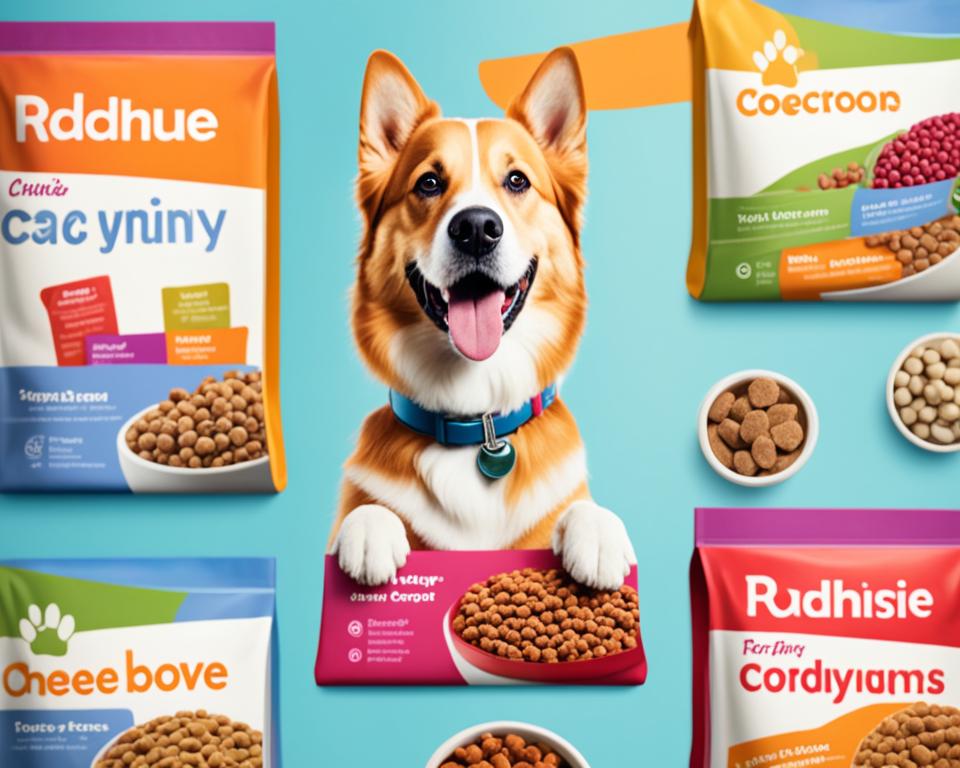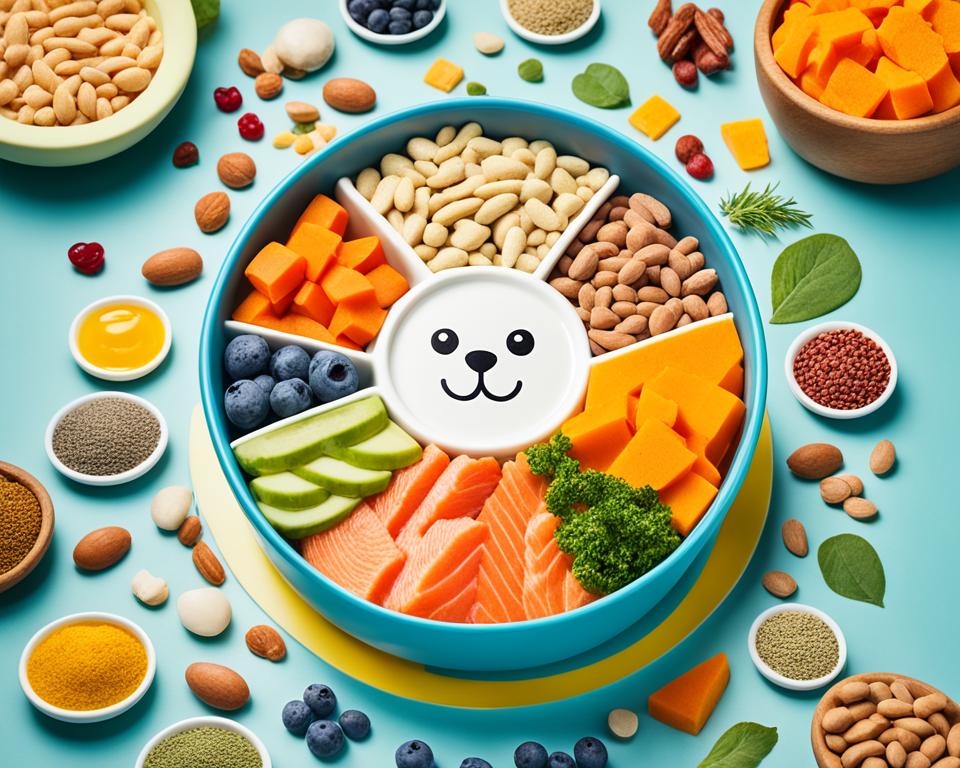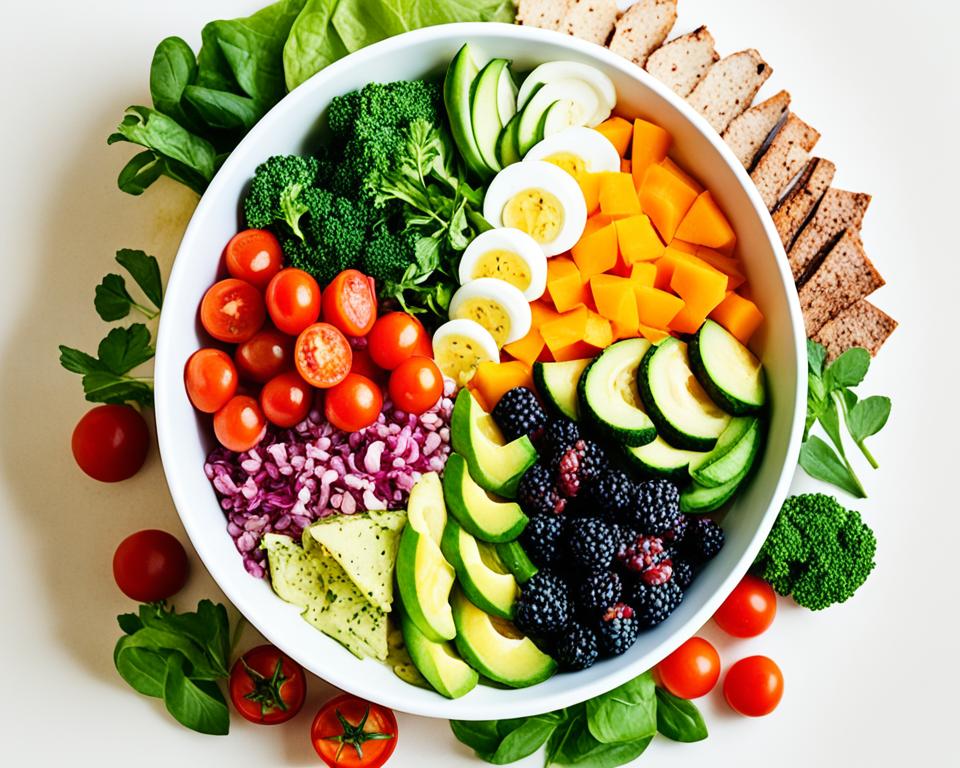As a pet owner, I’ve learned that what we feed our pets is key to their health. The pet food market is huge, over $90 billion worldwide. This shows how important good nutrition is for our furry friends.
About 55% of dogs and 60% of cats in the U.S. are too heavy. This fact made me see how crucial balanced food is for pet wellness. Experts say 80% of vets believe a good diet can prevent many health problems in pets.
Every pet, from young to old, needs special food. Giving them the right diet keeps them healthy and can stop many illnesses. It’s amazing how much the right food can do for our pets.
The Importance of Balanced Nutrition for Pets
Feeding our pets the right diet is key for their health and happiness. As a pet owner, I’ve learned that balanced nutrition keeps our pets healthy and active. Let’s explore why proper pet food is vital and its impact on our pets.
Essential Nutrients for Optimal Health
Pets need various nutrients to stay healthy. Good dog and cat food should have:
- Proteins for muscle growth and repair
- Carbohydrates for energy (30-70% of pet food)
- Fats from sources like fish and chicken
- Vitamins and minerals for a strong immune system
How Proper Nutrition Affects Pet Wellbeing
Right food makes a big difference. Pets with balanced diets have:
- More energy for playtime
- Healthier skin and shinier coats
- Better weight management
- Stronger immune systems
It’s amazing how nutritious food can boost our pets’ lives.
The Role of Diet in Preventing Common Health Issues
A proper diet protects pets from health problems. Choosing the right food helps prevent:
- Obesity, a growing concern in pets
- Dental issues (dry food can help reduce plaque)
- Heart problems (watch out for grain-free diets in dogs)
- Digestive troubles
Cats need meat-based protein and should not eat vegetarian diets. Picking the right pet accessories, like food bowls that encourage slower eating, supports your pet’s health.
Understanding Your Pet’s Nutritional Needs
As a pet owner, I know it’s key to give the right food for good health. Every pet has special needs that change as they grow.
Dogs are omnivores. They need both plants and animals in their diet to stay healthy. Their diet should include water, proteins, fats, carbohydrates, minerals, and vitamins for the best health.
Calories differ among pets. For an adult indoor dog with little exercise, I use this formula: 30 x weight in kg + 70. This gives me a daily calorie estimate. But, age, size, and activity can change this.
Protein is key for all life stages. It helps with muscle building and many body functions. The right amount depends on your pet’s life stage. Puppies need more for growth, while adults need less for upkeep.
“There’s no one-size-fits-all approach to pet nutrition. Each animal is unique and deserves a tailored diet.”
Fatty acids are important for skin, coat, brain, and immune health. Some pets may need more due to conditions like arthritis or cancer. Always talk to a vet to make the best diet plan for your pet.
Good nutrition is not just about what you feed your pet. It’s also about how you feed them. For most dogs, I suggest feeding once or twice a day, in 2-3 meals. This keeps their energy steady all day.
Decoding Pet Food Labels: What to Look For
Shopping for pet food can be tough with so many choices. It’s key to know what’s in the food for my pet’s health. Let’s look at what makes good dog or cat food.
Key Ingredients in Quality Pet Food
Look for a main animal protein at the start of the list in good pet food. Whole grains, veggies, and fruits are good too. They give my pet the nutrients they need.
Identifying Harmful Additives and Fillers
Stay away from pet foods with lots of fillers and artificial stuff. These can hurt my pet’s health. I choose foods with natural stuff that helps them stay healthy.
AAFCO and WSAVA Guidelines for Pet Food
The Association of American Feed Control Officials (AAFCO) has rules for pet food. I check for the AAFCO statement on labels. It means the food is complete and right for my pet’s life stage.
| AAFCO Rule | Requirement |
|---|---|
| 95% Rule | 95% of named ingredient, 70% total product |
| 25% Rule | 25% of named ingredients, 10% total product |
| “With” Rule | At least 3% of named ingredient |
| Flavor Rule | Detectable amount of ingredient |
The World Small Animal Veterinary Association (WSAVA) says pick pet food made by full-time nutritionists. They should also do feeding trials. This makes sure the food is right for my pet at any life stage.
Pet Food: Choosing the Right Type for Your Furry Friend

Finding the right pet food can be hard. Dogs and cats are true carnivores. They do best on meat-based diets full of animal proteins. When I look at pet supplies, I remember this. The Association of American Feed Control Officials (AAFCO) has been making sure our pets get what they need for over a century.
There are many dog and cat food choices out there. Dry kibble is easy to use and good for your pet’s teeth. Wet food has more moisture and tastes better. Raw diets try to be like what pets eat in the wild but need to be handled safely. Homemade diets let you pick the ingredients but must be balanced right.
When picking pet food, I look for high-quality protein as the main ingredient. I stay away from meat by-products and too many fillers. The label’s guaranteed analysis tells me about the protein, fat, fiber, and moisture levels.
| Food Type | Benefits | Considerations |
|---|---|---|
| Dry Kibble | Convenient, dental health | Lower moisture content |
| Wet Food | Higher moisture, palatable | Shorter shelf life once opened |
| Raw Diet | Mimics natural diet | Requires careful handling |
| Homemade | Ingredient control | Needs careful nutritional balancing |
Different pets need different foods at different times. Puppies and kittens need lots of protein to grow. Senior pets do well on foods with fewer calories and more fiber. Some dog breeds need special nutrients for their joints.
Choosing the best pet food is key for your pet’s health. Always talk to your vet, especially if your pet has health issues. With the right knowledge and quality pet accessories, you can make sure your pet stays healthy and happy.
Tailoring Diets for Different Life Stages
As a pet owner, I know that the right food is key for my pet’s health. Pets grow and change, so their diet must too. It’s important to adjust their food for each life stage.
Puppy and Kitten Nutrition
Puppies and kittens need lots of protein and calories for fast growth. I feed them three to four times a day until they’re six months old. They need more protein and energy than adult dogs for muscle and organ growth.
Big breed puppies should eat less to avoid too much growth. This helps them grow healthy.
Adult Pet Dietary Requirements
Adult dogs need food with at least 18% protein and 5% fat. They need balanced food to stay healthy and avoid getting too fat. They also need 30 minutes of exercise a day to match their diet.
Senior Pet Nutritional Considerations
Senior dogs start eating special food around seven years old. I add more protein to help keep their muscles strong. I also add omega-3 fatty acids to help with joint pain and reduce inflammation.
This special diet helps them stay well as they get older.
| Life Stage | Protein Needs | Fat Needs | Special Considerations |
|---|---|---|---|
| Puppy/Kitten | High | High | Frequent meals, growth support |
| Adult | Moderate | Moderate | Weight management, balanced nutrition |
| Senior | High | Moderate to Low | Joint support, digestive health |
By changing their food for each life stage, I make sure my pet gets the best nutrition. This helps them stay healthy and happy for a long time.
Special Dietary Considerations for Pets with Health Issues
Pet health is closely linked to what they eat, especially for pets with health issues. Tailoring their diet can greatly improve their wellness. Pets with food intolerances may have upset stomachs or gas from certain foods.

When dealing with food allergies, vets often suggest an elimination diet. This method helps find out what causes symptoms like itching, gas, diarrhea, or ear infections. It’s important to work with a vet to make sure your pet gets the right nutrition.
For older pets, special diets can really help. These meals manage weight and digestion and meet the changing needs of older pets. Some pets need special diets, like Royal Canin Veterinary Diet for dogs and cats.
- Dogs need high-quality protein sources like chicken, beef, or fish
- Cats require even higher protein content as obligate carnivores
- Both species benefit from healthy fats for skin and coat health
- Vitamins and minerals from fruits and vegetables support overall pet wellness
When changing your pet’s diet, do it slowly to avoid stomach upset. Always talk to a vet before big diet changes, especially for health issues. With the right diet, your pet can live a better life.
The Benefits of Wet vs. Dry Pet Food
Choosing between wet and dry pet food can be hard. Each type has its own benefits. Knowing these can help you pick the best for your pet.
Advantages of Wet Food for Hydration
Wet pet food is full of water, making it great for pets who don’t drink enough. It’s perfect for pets with urinary or kidney problems. Plus, pets love the taste, even the picky ones.
Dry Food’s Role in Dental Health
Dry pet food is key for good dental health. Its crunchy texture helps fight tartar and keep gums healthy. It’s also easy to store and cheaper than wet food.
Combining Wet and Dry Food for Optimal Nutrition
Using both wet and dry pet food is a smart move. It gives your pet balanced nutrition, enough water, and dental care. The right mix depends on what your pet likes and needs.
| Feature | Wet Pet Food | Dry Pet Food |
|---|---|---|
| Moisture Content | ~78% | ~10% |
| Dental Benefits | Limited | Helps reduce plaque |
| Convenience | Shorter shelf life | Long shelf life, easy to store |
| Cost | Generally more expensive | Often more affordable |
When choosing, pick high-quality pet supplies from trusted brands. This ensures your pet gets the best nutrition.
Homemade and Raw Diets: Pros and Cons

More pet owners are choosing homemade and raw diets for their pets. These diets have good points for pet health but also have challenges. Let’s look at the good and bad of these pet food choices.
Homemade diets let owners pick what goes into their pet’s food. This is good for pets with special needs or allergies. But, making a balanced diet can be hard. Pets might not get all the nutrients they need without expert advice.
Raw diets try to copy what pets eat in the wild. Owners say pets have shinier coats, cleaner teeth, and more energy. A study in the Journal of the American Veterinary Association found these benefits. But, raw diets have risks too:
- Bacterial contamination from raw meat
- Potential nutritional imbalances
- Risks associated with bones (choking, dental damage)
Always talk to a vet before trying homemade or raw diets. They can make sure your pet gets what it needs. Remember, many commercial pet foods are safe and easy to use for most pets.
80% of dog owners believe in providing their pets with a high-quality diet to enhance their physical and mental health.
Choosing homemade, raw, or commercial pet food aims for the best nutrition for your pet. Always think about what your pet needs and get advice from experts.
Supplementing Your Pet’s Diet: When and How
Many pet owners wonder about pet supplements for their pets’ health. A balanced diet is crucial, but sometimes pets need extra help. Supplements can fill in nutritional gaps or help with health issues. Omega-3 fatty acids are great for skin and joints, while probiotics aid digestion.
But not every pet needs supplements. Too many can be bad for them. Always talk to a vet before giving your pet supplements. They can tell if your pet really needs them or if their diet is okay.
If you choose to use supplements, start with a small amount. Mix them into your pet’s food and watch how they act. Options like glucosamine for joints and multivitamins for overall health are common. Also, consider natural options like raw chicken feet or green-lipped mussels. The aim is to boost their diet, not replace it with treats or supplements.

